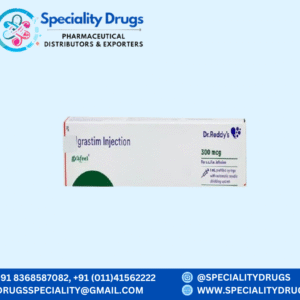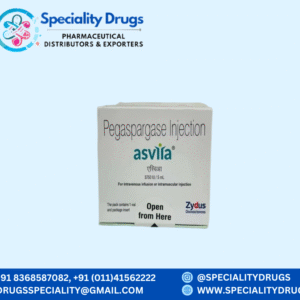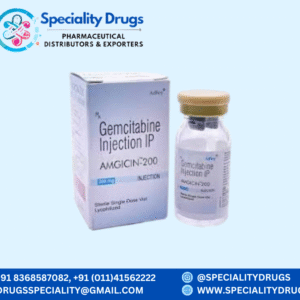What is Vasopressin Injection?
Vasopressin Injection is a sterile, injectable preparation containing the synthetic form of Vasopressin Injection, a natural hormone produced by the hypothalamus and released by the pituitary gland. Vasopressin Injection is also known as antidiuretic hormone (ADH). It plays a critical role in regulating the body’s retention of water and constricting blood vessels to help maintain blood pressure.
What is the Use of Vasopressin Injection?
Vasopressin Injection is primarily used in emergency and critical care settings. Key uses include:
-
Treatment of Vasodilatory Shock: Such as septic shock that does not respond to fluids and catecholamines (e.g., norepinephrine).
-
Control of Bleeding: For esophageal variceal hemorrhage by constricting splanchnic circulation.
-
Management of Diabetes Insipidus: Short-term therapy in patients with central (neurogenic) diabetes insipidus to reduce excessive urination.
-
During Cardiopulmonary Resuscitation (CPR): As an alternative to epinephrine in cardiac arrest protocols (though this use has declined in recent guidelines).
Benefits of Vasopressin Injection
-
Rapid Action: Quickly increases vascular tone and blood pressure in shock.
-
Improved Perfusion: Enhances circulation to vital organs during severe hypotension.
-
Hemostatic Effect: Reduces bleeding in certain gastrointestinal emergencies.
-
Water Retention: Helps restore fluid balance in diabetes insipidus.
-
Alternative to Catecholamines: Useful when conventional vasopressors are insufficient or contraindicated.
How is Vasopressin Injection Given?
Vasopressin is administered intravenously, typically as:
-
A continuous infusion for shock management.
-
An IV bolus during cardiac arrest.
-
Diluted infusion for bleeding control.
Dosing and administration must be guided by a healthcare professional experienced in critical care.
Side Effects of Vasopressin Injection
Like all potent medications, Vasopressin Injection may cause side effects, including:
-
Reduced Blood Flow to Extremities: Potential skin or tissue ischemia.
-
Abdominal Cramps or Nausea.
-
Arrhythmias (Irregular Heartbeat).
-
Hypertension (High Blood Pressure).
-
Water Retention and Hyponatremia (Low Sodium).
-
Chest Pain or Myocardial Ischemia.
-
Headache or Tremor.
Patients require close monitoring to detect and manage adverse effects promptly.
Precautions
-
Use with caution in patients with coronary artery disease.
-
Avoid extravasation (leakage into surrounding tissue).
-
Regularly monitor blood pressure, electrolytes, and perfusion.
-
What is Vasopressin Injection used for?
Vasopressin Injection is mainly used to treat vasodilatory shock (such as septic shock), control bleeding from esophageal varices, manage diabetes insipidus, and sometimes during cardiac arrest. -
How does Vasopressin work in the body?
Vasopressin causes blood vessels to constrict (vasoconstriction), which raises blood pressure. It also reduces urine output by increasing water reabsorption in the kidneys. -
How is Vasopressin Injection administered?
It is given by intravenous (IV) infusion or IV bolus injection, depending on the condition being treated. Administration must be done by healthcare professionals in a monitored setting. -
What are the benefits of using Vasopressin in shock?
It can quickly improve blood pressure when other medications (like norepinephrine) are not effective, helping maintain circulation to vital organs. -
Can Vasopressin Injection be used for all types of shock?
No. It is mainly indicated for vasodilatory shock (especially septic shock). It is not typically used for hypovolemic or cardiogenic shock. -
What are the common side effects of Vasopressin Injection?
Side effects may include reduced blood flow to the skin or extremities, headache, nausea, abdominal cramps, arrhythmias, high blood pressure, and water retention. -
Can Vasopressin cause low sodium levels?
Yes. Because it promotes water retention, it can lead to hyponatremia (low sodium), requiring careful electrolyte monitoring. -
Is Vasopressin safe in patients with heart disease?
Caution is advised, as vasoconstriction may worsen coronary ischemia and increase the risk of chest pain or heart attack. -
How quickly does Vasopressin Injection start working?
It acts rapidly—effects on blood pressure are often seen within minutes of administration. -
How long does the effect of Vasopressin last?
The duration depends on the dose and route, but the half-life is short—typically 10–20 minutes—so continuous infusion may be needed to maintain effect. -
Is Vasopressin Injection the same as Desmopressin?
No. Desmopressin is a synthetic analogue with primarily antidiuretic effects and less vasoconstriction. Vasopressin has stronger vasoconstrictive properties. -
Can pregnant or breastfeeding women use Vasopressin Injection?
It should only be used if clearly needed, under strict medical supervision. The risks and benefits must be carefully evaluated. -
Does Vasopressin interact with other medications?
Yes. It may interact with drugs that affect blood pressure, cardiac function, or electrolyte balance. Always inform your healthcare provider about all medications. -
What monitoring is required during Vasopressin administration?
Continuous monitoring of blood pressure, heart rate, urine output, electrolytes (especially sodium), and signs of reduced circulation to limbs or organs is essential. -
Is Vasopressin used outside of the ICU?
Rarely. Because of its potent effects and the need for close monitoring, it is primarily reserved for critical care settings.






Reviews
There are no reviews yet.